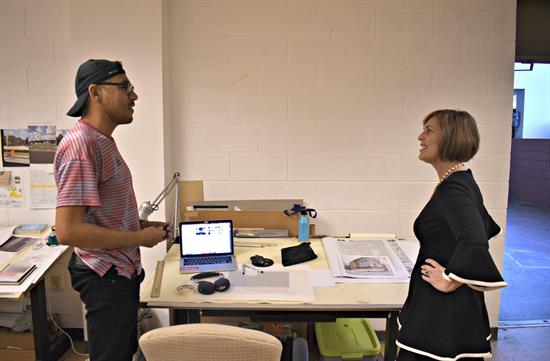U.S. Rep. Kathy Castor (FL14) announced today that the University of South Florida (USF) School of Architecture and Community Design’s Florida Center for Community Design and Research (FCCDR) is teaming up with community partners to tackle how we build and design Florida communities following the dire Intergovernmental Panel on Climate Change report and the cluster of ominous climate-related impacts to Florida, including Hurricane Michael, extended red tide and toxic algae.
“Hurricane Michael has shown us with its devastation to Mexico Beach, Panama City and other areas that – no matter how large or small – our communities are not immune to the effects of climate change and the extreme weather events these global changes bring,” U.S. Rep. Castor said. “As I continue my push in the U.S. Congress for legislation dedicated to reducing carbon pollution and building more resilient communities, we must also work together in our local communities to overcome fragmented approaches to climate change and create a more resilient economic and environmental foundation to mitigate and adapt to this global issue. The FCCDR at USF understands this need for action and is working with leaders in our community, including Hillsborough County Government and the Tampa Bay Regional Resiliency Planning Council, to help our neighborhoods plan comprehensive ways to overcome the impacts of our changing climate, rising sea levels and extreme weather.”
The FCCDR was establish in 1986 by the Florida Legislature with the mission of assisting Floridians create more livable and sustainable communities for our future. They have partnered with Hillsborough County to conduct an inventory and analysis of community vulnerabilities related to sea level rise, flooding, and storm event hazards. As part of their analysis, the center will assess public health factors including vulnerable populations and investigate design strategies to reduce the risk from anticipated flood scenarios. Their goal is to create a matrix and toolkit that will assist counties around the state in reducing risk equitably and preparing for future flood events.
“The Tampa Bay region is home to 4 million residents and our coastal infrastructure is particularly vulnerable to the impacts of climate change and extreme weather events,” U.S. Rep. Castor continued. “We must move past the politicization of climate change and come up with comprehensive answers to this global issue, and I look forward to working with the FCCDR and others dedicated to building a resilient future, instead of turning a blind eye to this crisis we are all facing.”
U.S. Rep. Castor is the Vice Ranking Member of the House Energy and Commerce Committee which has oversight responsibilities for environmental policies and is a leader in Congress on our environment. She is the author of the bipartisan and bicameral Florida Coastal Protection Act to ban oil drilling off the coast of Florida and has teamed up with U.S. Rep. Francis Rooney (R-FL-19) on amendments to accomplish this necessary goal.
Following the destruction caused by Hurricane Maria, U.S. Rep. Castor fought for the necessary resources Puerto Rico needs to rebuild for resiliency, especially as weather events become more extreme with our changing climate. She has also teamed up with U.S. Rep. Brett Guthrie (R-KY-2) on legislation included in the FAA Reauthorization Act of 2018 that would enable the concrete masonry industry to research and advertise materials that will better withstand volatile weather conditions caused by climate change.
“Climate change and more severe weather events demand action at all levels of government,” U.S. Rep. Castor concluded. “I will continue to press forward to reduce carbon pollution and build more resilient communities.”
###


